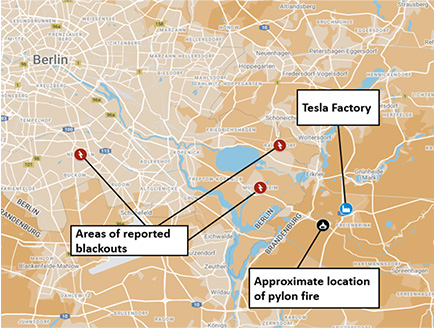Ecotage: An Overlooked Threat to Supply Chains

How vulnerable are supply chains to ecotage disruption?
In recent years, the term “ecotage” has emerged as a significant risk in various sectors. Stemming from the combination of ecological concerns and sabotage tactics, ecotage poses a growing threat to companies, public infrastructure, and communities.
Recent Incident: Tesla Gigafactory Attack in Berlin
On March 5th, the Tesla “gigafactory” in Gruenheide, Berlin, faced a devastating attack when eco-extremist group “Vulkangruppe” set fire to an electricity pylon, halting operations and causing extensive damages exceeding one billion euros.
The attack on the factory is the latest and most severe in a wave of ecotage actions increasingly directed against Tesla and other electric vehicle (EV) manufacturers in Europe and North America.
Understanding Ecotage
Loosely connected activist networks, often motivated by radical anti-capitalist or anti-industrial ideologies, carry out ecotage actions. These actions target not only traditional subjects but also increasingly focus on “green” companies, aiming to disrupt operations and attract attention to their cause.

Tesla factory fire affected locations within greater Berlin
Ecotage is evolving with the involvement of unaffiliated individuals, such as the “Tyre Extinguishers,” who operate independently through social media platforms to inspire and execute disruptive actions. This stochastic approach poses unique challenges for identifying and preventing attacks.
Unique Risks Posed by Ecotage
Unlike other forms of attacks, this primarily targets material assets and public infrastructure, exploiting vulnerabilities in dispersed networks and supply chains. This decentralised approach makes it difficult to predict and defend against, posing significant challenges for affected companies.